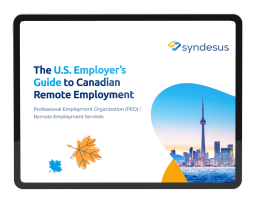H-1B cap season is always stressful, and this year, there are a few additional updates to the process that applicants need to take into account. On one hand, these updates are set to increase the efficiency of the H-1B application and filing process. On the other hand, it’s an added load during an already busy and stressful period.
However, the H-1B cap, and thus the H-1B lottery, is not changing, so, like always, there will be those who are not selected in the lottery and whose US employment opportunities will be shattered.
This article will discuss some of the changes coming with the H-1B process this year and what US employers and H-1B hopefuls can do if they aren’t selected and don’t have US immigration options remaining. As a note, this article is legal advice, and if you have questions about a potential or ongoing H-1B visa application, you should reach out to an immigration lawyer for professional advice.
Alright, let’s dive in.
Recent challenges with H-1B cap season
The H-1B visa is one of the main pathways for employers to sponsor highly skilled foreign workers to live and work in the US temporarily. H-1B visas issued each year are subject to a strict cap — the standard H-1B cap is set at 65,000 visas per fiscal year, with an additional 20,000 visa allocation reserved for individuals holding a master’s degree or higher. Still, demand for H-1B visas has consistently exceeded this cap for the past two decades.
Each year, the USCIS (US Citizenship and Immigration Services) conducts a lottery to determine who can file a full H-1B petition. The introduction of electronic registration for the lottery in 2020 streamlined the process but has also contributed to historic H-1B registration numbers. In 2023, USCIS received 758,994 registrations for 2024, meaning that, effectively, just 14.6 percent of applicants had a chance to be selected. The high number of H-1B registrations underscores the intense competition for these visas
Ultimately, the lottery system means that even highly qualified individuals may face disappointment, as there is no guarantee of selection. Even if a candidate is selected in the H-1B visa lottery, applying is a headache in itself. They may need to wait for months for approvals and later face excessively long wait times to obtain a green card (US permanent residency). On the flip side, US employers face an increasingly tough time hiring and retaining the talent they need.
What’s changing during the 2024 H-1B cap process?
While reflecting the visa’s desirability, the high volume of H-1B registrations has also led to concerns about fraud. Encouraged by a simpler online registration, in 2023, some companies were found to be entering the same applicants into the lottery multiple times to increase their chances. The number of registrations that applied more than once rose to 408,891.
To address this, USCIS has implemented two significant changes for the 2024 H-1B cap season.
1) Enhanced H-1B lottery application integrity
USCIS aims to strengthen the integrity of the registration process by implementing measures to prevent faulty registrations and reduce abusive practices. Instead of selecting H-1B registrations based on the employer, USCIS will use a beneficiary-centric model meaning each potential H-1B worker (beneficiary) will be the focus of the selection process. This method is designed to prevent a single employer from submitting multiple registrations for the same beneficiary, increasing their odds in the lottery. To implement this, employers will need to provide valid passport or travel document information for each applicant. This will hopefully ensure a more level playing field, where each qualified candidate has an equal chance of selection.
2) Electronic filing for Form I-129 for H-1B visa application
In an effort to continue to digitize the H-1B process, USCIS will now require online filing of Form I-129 (H-1B visa application form) and Form I-907 (premium processing request form). This provides a more streamlined and potentially faster process for petitioners, moving away from traditional paper-based submissions.
These changes aim to improve fairness in the H-1B lottery process and provide a more efficient application experience. However, there’s still the problem of there being many more applicants than visas available.
If you don’t get selected in the H-1B lottery doesn’t, what can you do?
The limited number of H-1B visas available can leave US tech companies seeking alternative ways to secure and retain their top international talent in the event the H-1B lottery doesn’t work out. And in case no other US immigration options exist for a particular candidate or current employee on, e.g., an F-1 student visa, Canada presents a compelling solution. Indeed, major US tech companies have already been expanding their Canadian presence, and the booming tech scene shows no sign of slowing down.
Canada’s friendly immigration system is a huge draw for those companies and employees who are tired of dealing with the H-1B lottery system. The Global Talent Stream (GTS) program is a fast-tracked work visa process, with work permits being secured within just two weeks. It also offers employees a streamlined pathway to permanent residency and Canadian citizenship, giving them many more immigration options than they may have had before.
If a company struggles to find tech workers for its Canadian office, it can leverage GTS to bring talent from abroad quickly and relatively easily into its Canadian office.
You don’t need an office in Canada to hire remotely, either. A canadian employer of Record (EOR), which acts as an employee’s legal employer in Canada and provides all the HR, legal, tax, payroll, and immigration services for remote hiring, enables US companies to hire workers remotely in a country, in this case Canada, where they don’t have an office.
And for tech workers in the US who risk losing their job offer if they aren’t selected in the H-1B visa lottery, they should consider applying for a Canadian tech job at a company that’s seeking foreign talent. After eventually getting Canadian citizenship, the worker can even move back to the US in the future, with new experience gained while working in Canada — opening up new immigration pathways to the US.
Syndesus can help US companies hire tech workers remotely in Canada
Syndesus can help US companies hire tech workers remotely in Canada if they aren’t selected in the H-1B lottery. Whether you’re a small US tech startup or a large corporation, Syndesus can help you avoid the headache of dealing with H-1B visa issues by helping you move your unsuccessful H-1B applicants to Canada. You can bypass the uncertainty, lottery, and backlogs and instead hire and retain all the skilled tech employees you need.
Syndesus offers PEO and EOR services, which cover all hiring, immigration, payroll, HR, tax, legal, and other administrative processes.
For tech workers who don’t have a job offer after the H-1B lottery, visit Path2Canada to browse Canadian employers that are eager to hire.
Reach out to us to learn more about how we can help you hire and retain talent remotely in Canada!

About Marc Pavlopoulos
Marc Pavlopoulos is the CEO and Founder of Syndesus, a Professional Employer Organization that provides PEO services for US companies seeking to employ workers remotely in Canada, builds engineering teams in Canada for VC-backed startups in the US, and set-up remote offices in Canada for US companies. Additionally, Syndesus can assist foreign-born tech workers (and their US employers) with options for working remotely in Canada if they cannot stay in the US due to immigration/work visa issues.
As an American who has moved to Canada twice (for grad school and for work), Marc understands the challenges involved in starting a new life in a new country. Marc is a son of an immigrant and has great respect for people who leave their home country and seek a better life in the US or Canada.
Marc’s goal is to do everything he can to help those individuals achieve their dreams. Marc also has a second venture (Path to Canada) which helps foreign-born technical workers who cannot stay in the US (for immigration reasons) get a job and work authorization to work in Canada.



